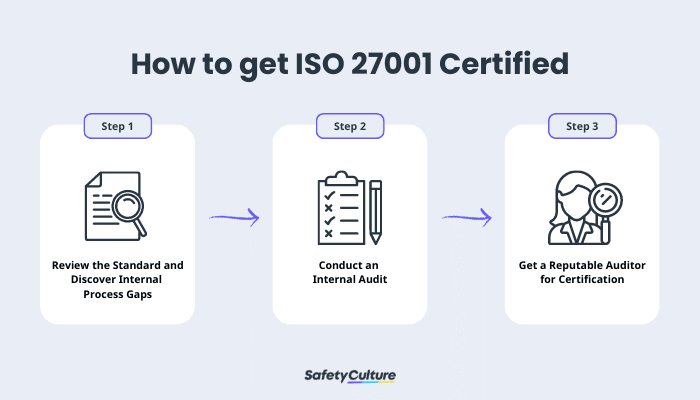What is ISO 27001?
ISO 27001 is an international standard that sets a framework for ISMS or Information Security Management System in the context of the organization. The international standard for ISMS that companies can get certified for, ISO 27001 is officially known as ISO/IEC 27001:2013 and it was created by a committee composed of experts from the International Organization for Standardization (ISO) and the International Electrotechnical Commission (IEC).
ISO 27001:2013 is not to be confused with ISO/IEC 27000:2018, another ISO/IEC 27000 standard, which intends to define the common terminologies used in the ISMS body of standards.
Why is it Important?
ISO 27001 is important because it sets a benchmark for the kind of ISMS framework that businesses or organizations can implement and fine-tune according to their needs. It sets a minimum standard for information security management system that can be expected of any business, regardless of size, industry, or location, that seeks to be recognized as having a robust ISMS.
Industries and Organizations that Faced Challenges in Information Security
As digital technology became integral to the day-to-day operations of businesses and organizations, so did the need for securing the digital information that comes with running these enterprises. Here are some of the fields that faced challenges in information security:
Achieving a robust information security management system will need a concerted effort within an organization and the know-how to maintain it.
What are the Requirements of ISO 27001?
One of the advantages of implementing ISO 27001 is that it requires proof that existing processes contribute to keeping information secure and that the unique needs of the business in maintaining a strong ISMS are taken into account.
Below are outlined clauses 4.1 through 10.2 which are the core requirements of ISO 27001. They help discover process gaps and assess the readiness of an organization for the ISO 27001 certification.
- 4. Context of the Organization
- 4.1 Understanding the organization and its context
- 4.2 Understanding the needs and expectations of interested parties
- 4.3 Determining the scope of the information security management system
- 4.4 Information security management system
- 5. Leadership
- 5.1 Leadership and commitment
- 5.2 Policy
- 5.3 Organizational roles, responsibilities, and authorities
- 6. Planning
- 6.1 Actions to address risks and opportunities
- 6.2 Information security objectives and plans to achieve them
- 7. Support
- 7.1 Resources
- 7.2 Competence
- 7.3 Awareness
- 7.4 Communication
- 7.5 Documented information
- 8. Operation
- 8.1 Operational planning and control
- 8.2 Information security risk assessment
- 8.3 Information security risk treatment
- 9. Performance Evaluation
- 9.1 Monitoring, measurement, analysis, and evaluation
- 9.2 Internal audit
- 9.3 Management review
- 10. Improvement
- 10.1 Nonconformity and corrective action
- 10.2 Continual improvement
How to get ISO 27001 Certification?
ISO/IEC 27001:2013 is the international standard for ISMS among the ISO 27000 family that companies can get certified for. Organizations and businesses can follow these steps to prepare for ISO 27001 certification:

Step 1: Review the Standard and Discover Internal Process Gaps
Get familiar with the ISO/IEC 27001:2013 standard and check how your existing internal processes align with it. Check your current ISMS and these three in particular—information security policy, statement of applicability, and information security risk treatment plan—because the standard requires these documents for an organization to get certified.
Step 2: Conduct an Internal Audit
Assess the readiness of your organization by conducting an internal audit using an ISO 27001 checklist that takes into account the three documents and other details about your ISMS that third-party auditors will be looking into during the actual certification audit.
Create Your Own ISO 27001 Checklist
Eliminate manual tasks and streamline your operations.
Get started for FREEStep 3: Get a Reputable Auditor for Certification
After you’ve done your own internal audit and prepared your organization as best as you can, get in touch with a third-party auditor that can conduct an objective audit in order to get a certification for your business.
Once certified, the business then needs to maintain its compliance. Conducting regular internal audits can help ensure that the ISMS in place is still effective against threats to information security and aligns with global standards.
Further information can be found here: A Comprehensive Guide to the ISO 27001 PDF.
How Can SafetyCulture (formerly iAuditor) Help Your Organization get Certified?
SafetyCulture is used by industry leaders in order to align with international standards such as ISO 27001 and conform with applicable regulations. SafetyCulture can help businesses prepare for ISO 27001 certification through the following:
- Conduct internal audits to discover process gaps using templates such as the ISO 27001:2013 checklist that users can customize to fit the needs of the organization
- Capture areas for improvement and efficiently record the corrective actions done in preparation for certification
- Secure information that is accessible only to authorized personnel via the cloud, a system that is already compliant with ISO 27001
- Maintain compliance with the standard through regular reviews of the current ISMS



